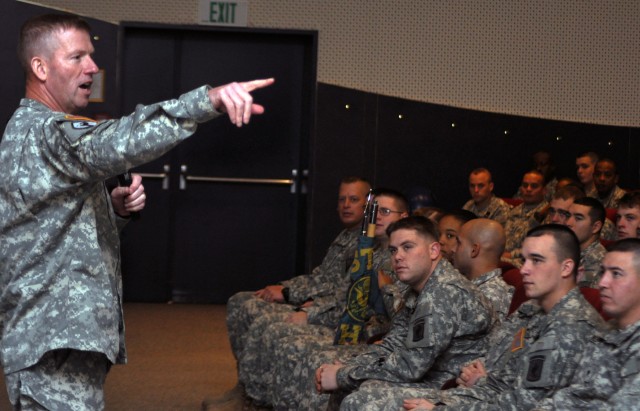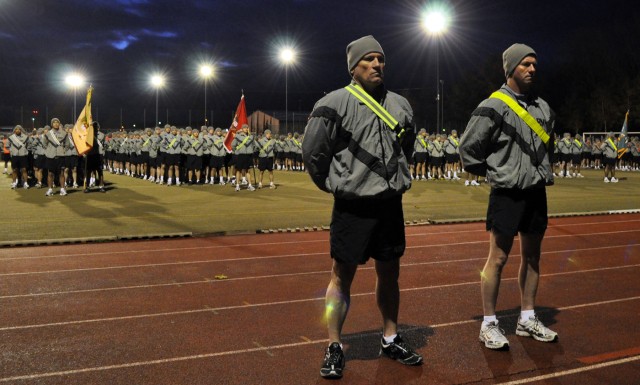BAMBERG, Germany - The Army's most senior noncommissioned officer met with Soldiers in Bamberg on Nov. 5 to thank them for their military service and their continued effort to be consummate professionals.
Sgt. Maj. of the Army Kenneth O. Preston focused on several Army issues during his visit, which include the Army's strengths, successes and challenges.
"There is no doubt in my mind that we are Army Strong," Preston said after a 3-mile run with the troops.
U.S. Army Europe Command Sgt. Maj. Ralph Beam joined Preston during his half-day visit and the two spoke with senior NCOs briefly before the run.
First sergeants and sergeants major were able to express issues to Preston involving the challenges their units face.
As the Sergeant Major of the Army, Preston serves as an advocate for enlisted Soldiers and is an advisor and assistant to the Army Chief of Staff on matters pertaining to enlisted Soldiers, Beam said. He tries to make the Army function better as an institution and works to resolve issues that are a challenge to the Army's personnel and family members.
Preston met with troops later in the day for a town-hall style meeting.
In the meeting with Bamberg Soldiers, Preston was able to explain some of the more complex issues the Army confronts and was able to sum up reasons for certain actions the Army implements.
Preston did that by explaining a meeting he had with President Barrack Obama earlier this year.
The President met with senior enlisted advisors to hear the "unvarnished truth" about issues affecting military enlisted service members, Preston said. The discussion, in part, addressed deployment rotations, changing duty stations and bettering the institution. It also focused on the stress placed on the Army, its personnel and military family members.
"Being deployed away from home, away from your family, for 12 or 15 months is ...stressful," Preston said he explained to the President. "It is also stressful when you come back from a deployment." In the past few months, several troops in Bamberg have returned from a deployment. Last month, members of the 16th Sustainment Brigade returned from a 15-month tour in Iraq. Members of 54th Engineers have also redeployed in the past few months from operations in both Iraq and Afghanistan. Preston answered questions, congratulated Soldiers who recently returned from a deployment and gave encouragement to paratroopers from 173rd Airborne Brigade Combat Team who will soon deploy to Afghanistan. A few Soldiers also returned from a deployment in Romania and there are some Soldiers participating in exercises in Africa.
Immediately after a deployment, units try to normalize things by giving Soldiers regular duty hours and time to spend with family.
"As you come out of the first 90-day period and move into the second 90-day period, things begin to pick up and when commanders change command," he said.
This is the same time some NCOs begin rotating out of the units.
"That can create a little bit of stress and anxiety in the unit," Preston explained to the President. "We need those noncommissioned officers to be drill sergeants, recruiters and instructors in the school house." It is very important to rotate that operational experience back into the institution, Preston said to the President.
When meeting with troops in Bamberg, Preston didn't just explain his conversation with the President; he also addressed the importance of making sure the force is well trained and educated.
Preston expanded on military education and how advanced and basic noncommissioned officers courses can lead toward college credits.
"Whether it is the Warrior Leader Course, BNCOC, ANCOC, the sergeants major academy, all those courses provide and enhance our professional development. "The goal down the road is by the time you're a platoon sergeant you're working toward a bachelor's degree. By the time you get to the sergeant majors academy, you're working on a graduate degree. As part of your everyday normal operation, you continue to further your education.
"This way, not only are you serving your country and serving America's Army, but you are also making yourself better," he said.
Preston explained how education and leadership experience in the military are a valued trait in the civilian sector.
"What you take with you is that leadership experience and having had the opportunity to lead Soldiers in the Army, with huge, massive amounts of responsibility, is something that nobody can take away from you. That is what the civilian workforce looks for," Preston said. "You are going to be sought after for your NCO leadership abilities."
Preston has also been an enormous advocate for military families. He has been working on the Interstate Compact on Educational Opportunity for Military Children, which addresses the inequities facing schoolchildren of military parents who must relocate across state lines when their parents change duty station.
Preston said he is trying to get all U.S. states and territories to adopt the initiative into states legislation.




Social Sharing